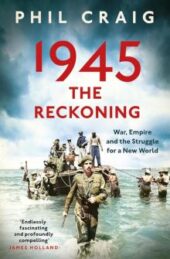There have been many accounts of the disasters followed by the triumph of the Burma campaign in the Far East war, but few with the detail and perceptive analysis of A War of Empires. Robert Lyman is of course a noted authority on the history of the region, and his biography of Bill Slim is a model of how such studies should be constructed. Here the reader is taken through the entire campaign from start to finish with a particularly good introduction setting out the political and military background of all the players. As an ex-professional soldier, Lyman is well placed to understand the military aspects of the war but is also fully cognisant of the political imperatives which, at least in a democracy, dictate the limits of military action. The humiliating attempt at the defence of and then the scuttle from an underfunded and ill-equipped Burma is well covered as is the incompetent Arakan caper of 1943. The author is severely critical of Archibald Wavell, Noel Irwin and Wilfrid Lloyd, and the evidence he cites and the conclusions he draws have forced at least this reviewer to re-examine his own perceptions of Wavell.
It is refreshing to find some compassion for John ‘Jackie’ Smyth, blamed by many as having been solely responsible for the Sittang bridge disaster. Those of us who consider Wingate to have been a dangerous lunatic would be well advised to read Lyman’s succinct assessment of the man and his methods, which shows that many of Wingate’s ideas were sound, even if their execution was not. The lessons learned from fighting the Japanese and their application to the re-vamped training methods instituted by Claude Auchinleck to prepare the Indian Army for its return to the fray is well covered as is the obstruction caused by the unfortunate attitude of Churchill to consider the Indian army as nothing more than a ‘band of potential mutineers’. The book is perhaps more sympathetic to the motivation of those prisoners who chose to join ‘Netaji’s’ Indian National Army (that sided with Japan), than were those prisoners who withstood appalling brutality when refusing to join (including one subedar major of a Gurkha battalion who was beheaded), but the circumstances have been assessed in more detail than has been seen elsewhere.
The contribution of Auchinleck, unfairly sacked by Churchill and traduced by Montgomery, in rebuilding the army and of Slim in leading it are fully acknowledged, as is the prodigious logistic effort involved. The sequence of events and the battles in the subsequent victorious return to Burma are masterfully described, and where he finds ‘official histories’ in error Lyman says so and shows how. One of the major problems, perhaps the greatest problem next to the Japanese, was that the Far East in general and Burma in particular was bottom of the Allied priority for equipment, shipping, aircraft and manpower, much having to be improvised in India or on the battlefield.
One of the most helpful aspects of this book is the way in which the author describes the interplay between the various allies, all with the same ultimate aim – to defeat the Japanese – but all with their own differing agenda and coming at the common aim from different directions. The misconceptions, suspicions, cultural clashes and pure mutual ignorance all made coordination and concentration of effort very difficult and sometimes impossible, a prime example being the description of the relationship between Joseph Stillwell and Generalissimo Chiang.
Slim is rightly lauded for his far seeing and perceptive assessments of what was possible and what was not, and for his drive and leadership throughout – he will surely be recognised by future historians as being far and away the best British general of the Second World War. Each of the important battles is illustrated by a clear and unambiguous map, and the plates are well chosen.
A War of Empires is meticulously sourced, a delight to read and will surely be the definitive account of this, the most harrowing campaign of the Second World War.
Gordon Corrigan is a historian and writer, and author of The Second World War: A Military History.







